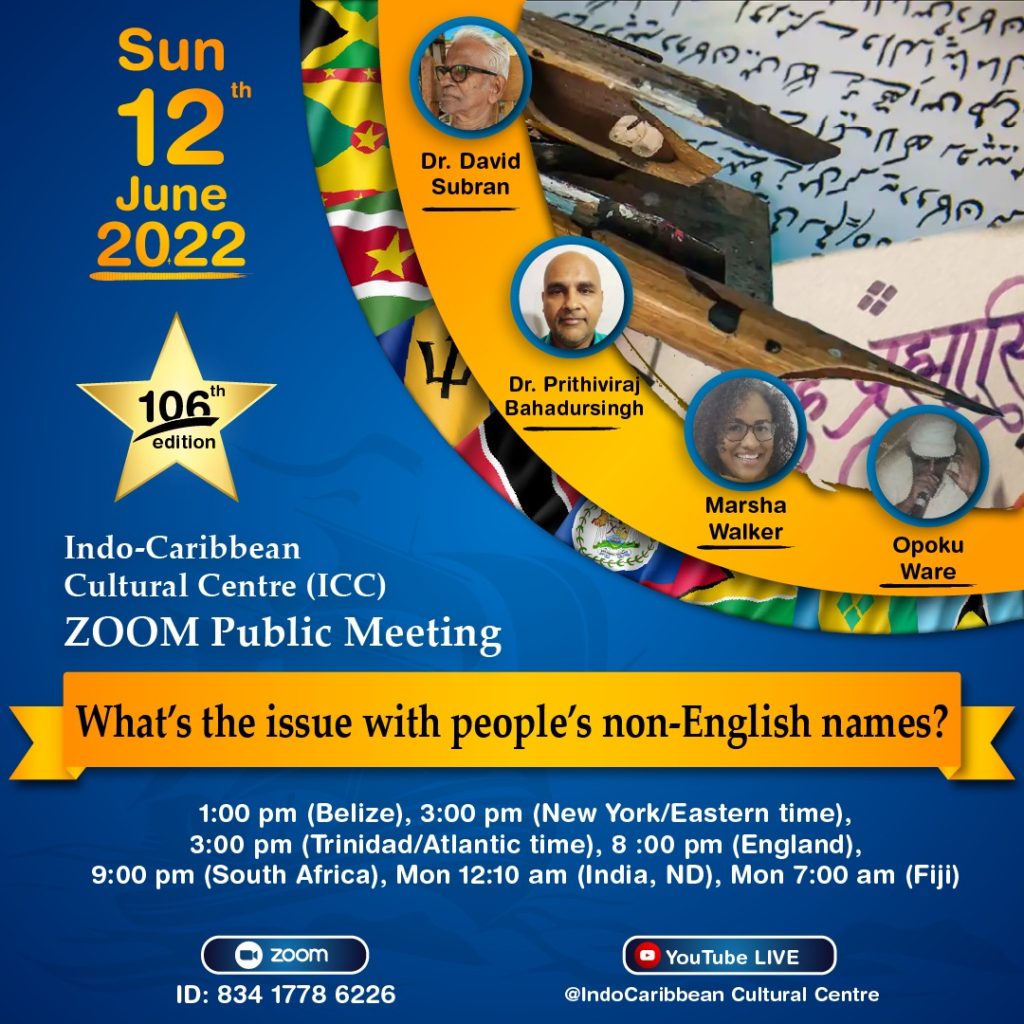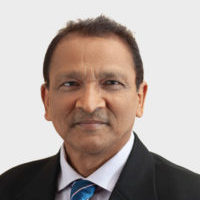
Invitation to 106th ICC Zoom Public Meeting by Nicholas Maraj
A name is just a sound other people make to get our attention. But at some point in our development, we begin to identify with our names. The name becomes the individual, and oftentimes, the individual protects it as though it were himself. Names are given at birth, while surnames have been passed along for generations, becoming a palpable link to the ancestors. Some given names may be original, others derived from scripture or nature, another a suggestion of a friend or relative, and yet another the amalgamation of the names of both parents. Above all, names give insight into one’s class, caste, race, religion and age, among other demographic factors.
For survivors of Western Europe’s colonial labour programs, names are a touchy issue. Most people of African descent lost their ancestral names after the transatlantic voyage. The names of their descendants, for a while, were largely bestowed by Christian missionaries. Indians in the Diaspora were able to maintain some semblance of their names, though record keepers, on arrival, butchered spellings and meanings, and the ancient identification process became muddled. In comparison to the English names of the white man and the emancipated African, Indian names were peculiar. Christian or English names allowed certain freedoms that a tribal name did not.
To get ahead, many people of Indian origin ditched those “funny-sounding” names for English names that conferred preference in employment, status and marriage. In the present generation, Indian names have taken a nosedive as parents opt for “better”, Western-sounding names. Though the discrimination is not blatant, something has caused Indians to reject traditional names. Ironically, the popularity of many traditional Christian names is also dwindling as names of African origin amongst the younger generation increase in number. So, it’s got to be asked, “What’s the deal with non-English names?
For survivors of Western Europe’s colonial labour programs, names are a touchy issue. In Trinidad, this was brought to the fore when Camille Robinson Regis, an MP from the governing PNM, the African-majority party, called out the entire name of the Opposition leader, “Kamla Susheilla Persad Bissessar” of the UNC, the Indian-majority party, three times consecutively to the raucous laughter of her followers at their political forum. It is odd and somewhat personal when people are addressed by their first, middle, maiden and marital names three times consecutively. What is the motive to ridicule the name or the person? Kamla retorted, “Why are you calling my name? Keep my name out of your mouth. At least I have a name from my ancestors, you have the name of a slave master.” There was an uproar for a week, and counting, and we’ve returned to normal. So, it’s got to be asked, “What’s the deal with non-English names?”
Camille’s distasteful motive in pronouncing, emphasising and repeating an Indian name followed on the heels of an article published in the Guardian (1/5/22) by political scientist Dr. Winford James. In his article, James tried to dissect the syllables of a beautiful Indian name and ascribe a vulgar meaning to it, equating “Hardik” with “Har-shit” and “Hard D*#k”? The shaming of Indian names by Dr. James, a former university linguistics lecturer, especially during Indo-Caribbean History and Heritage Month in May, is unforgeable.
Please join us THIS SUNDAY for the 106th weekly ICC ZOOM Public Meeting, June 12, 2022 at (1.00 p.m. Belize), (3.00 p.m. New York/Eastern time), (3.00 p.m. Trinidad/Atlantic time), (3.00 p.m. Guyana), (4.00 p.m. Suriname), (8.00 p.m. England), (9.00 p.m. South Africa), (Mon 12.10 a.m. India, ND), (Mon 7.00 a.m. Fiji).
Topic: What’s the issue with people’s non-English names?
Speakers:
- Dr. David Subran – Education consultant with a Ph.D. in Education from UWI; now preoccupied as an artist, representing the lives of the people of Trinidad and Tobago.
- Dr. Prithiviraj Bahadursingh – Community paediatrician who works mainly with children with disability. Coordinator of shivganga yatra procession with Chinmaya Mission
- Marsha Loraine Walker – Activist, author and a passionate advocate for responsible parenting who left the corporate world to spend more time with her young daughter.
- Opuku Ware – political, social and cultural activist based in Tobago; former Senior TUCO calypso member and bandleader; and the 1981 NJAC candidate for Tobago East
Followed by Q&A
Join Zoom Meeting THIS SUNDAY by touching or clicking on this link:
https://us02web.zoom.us/j/83417786226
Meeting ID: 834 1778 6226
No Passcode Needed
Live-streamed on the YouTube channel of the Indo-Caribbean Cultural Centre
https://www.youtube.com/user/dmahab
Hosted by www.indocaribbeanpublications.com
WhatsApp +1 868 756 4961 or +1 868 381 0386
dmahabir@gmail.com, indocaribbeanstaff@gmail.com
Please SHARE

is a full-time anthropologist at the University of Guyana (UG) and Fellow of The Eccles Centre for American Studies, British Library (2022-23). He is a former Assistant Professor at the University of Trinidad and Tobago (UTT). He obtained his Ph.D. in Anthropology from the University of Florida (UF). As a doctoral student, he won a Florida Caribbean Institute Award, an A. Curtis Wilgus Grant, and an Organization of American States (OAS) Fellowship.
Mahabir received a National Award (Hummingbird Silver Medal) for his contribution to education in his country in 2011. He was among 50 recipients who received a Distinguished Alumni Award from the UWI Alumni Association.
Mahabir is the author of 12 books to date.
